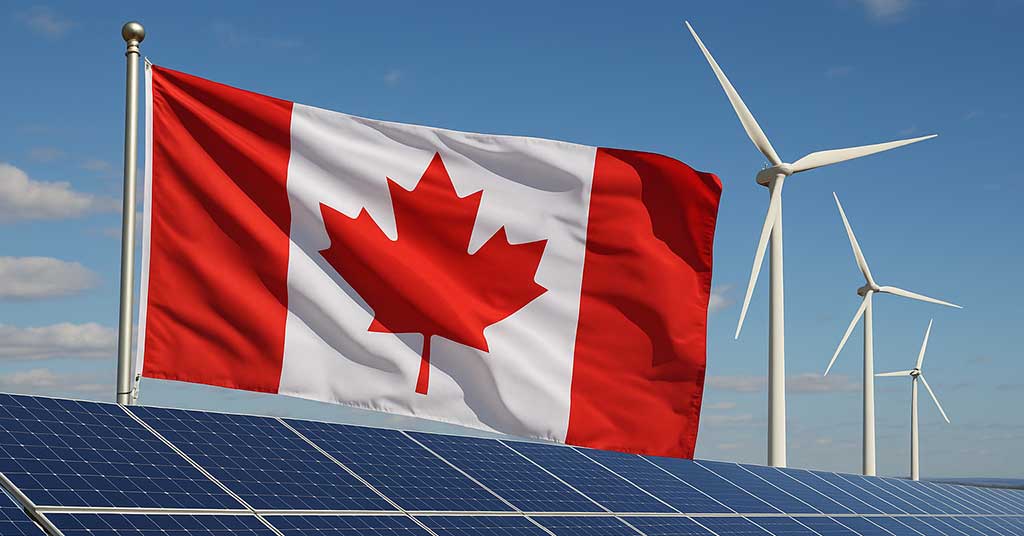Fossil fuel volatility and U.S. aggression threaten our sovereignty. Renewable energy is the way to protect our independence
Canada is facing real threats to its sovereignty. How rapidly, and how locally, we develop renewable energy will have a big impact on our ability to defend ourselves.
The United States has directly threatened to turn Canada into the 51st state by economic force and coercion. The U.S. administration has so far failed to make any significant headway in taking over Canada in this way, even backtracking for now, mainly because Canadians were quick to assert strong opposition to annexation.
But that same U.S. administration has consistently shown a willingness to swing back to flawed concepts over and over again, no matter how ridiculous.
U.S. policies have already thrown international markets into chaos and contributed to global crude prices plunging recently, bringing uncertainty to Canada’s existing oil and gas industry. We can expect more uncertainty ahead, with wild and unpredictable economic impacts hinging largely on the decisions of a few elite U.S. decision-makers. Those decision-makers seem to have little understanding of the dynamics of international trade or energy policy.
For oil- and gas-reliant provinces, the next few years could be disastrous if shifting employment to alternative industries is not treated as a priority. Oil and gas prices are primarily determined by international factors outside Canada’s control. They are volatile to begin with, let alone when the world’s most powerful economy is enacting tariffs on islands inhabited solely by penguins.
Contrary to the numerous flawed arguments against developing renewables, we already have solutions for when the sun does not shine or the wind does not blow. Interconnected grids, diversified renewables, energy storage and energy efficiency all play a role. But we cannot control global oil and gas prices and markets, which makes oil and gas the weak link in our energy chain.
Price volatility in oil and gas can have a marked effect on consumers as well, especially when corporations exploit market fluctuations for the sake of profit. As a recent report indicates, oil company profits lead to a cascade of economic shocks that cost Canadian households thousands of dollars. Further, despite those vast corporate profits, “relatively little was spent on reinvestment and employment and wages in the industry are still below 2019 levels.”
Renewables, by contrast, can be built on a Canadian supply chain, using Canadian aluminum and steel and strengthening Canadian manufacturing in the process. Renewable energy can lead to greater job growth than oil and gas, makes it easier to localize jobs and community benefits like revenue, and allows for more stable energy prices with better insulation from international market shocks.
The future of global energy is renewable, and Canada will face new challenges and threats as that future unfolds. Global demand for oil is set to peak by 2029 and then decline. Demand for gas will peak this decade, too, as other countries shift to renewable energy. A big part of the reason so many countries, especially in the Global South, are going renewable is not climate action but the improved energy security and sovereignty renewables provide.
Sixty-five per cent of Canadians agree that Canada should invest in renewable energy instead of fossil fuel developments, according to polling by Leger in March 2025. But even if you’re not yet convinced that oil and gas are on the way out, it’s clear we need to grow alternatives for employment.
The Chinese government also recognizes that the world is going renewable and is working to control global clean tech supply chains, expanding its international influence in ways that will shape global politics for the rest of the century.
The U.S. has done the Chinese government a huge favour by signalling its withdrawal from renewable energy as a key priority, effectively removing itself as the competition. Canada can and should step up as a leader by creating our own alternative renewable supply chain—one that could offer other countries an alternative to the Chinese government’s dominance.
At 18, my father, straight out of high school, went to work in Alberta’s oil sector and came back with enough money to help my grandparents out of a difficult spot. Anyone can understand the importance of that kind of opportunity.
As the sun sets on oil and gas development, the pride felt in building that industry, the freedom brought by oil and gas jobs and those economic opportunities do not need to die out with oil and gas corporations. We will need that same open door to opportunity, that same entrepreneurism, transferred to renewables.
But renewable growth will require a rapid plan to deploy renewable options, connect grids and electrify energy. It will require strong climate policies that compel corporations to invest in green innovation and jobs locally. For provinces like Newfoundland and Labrador, Alberta and Saskatchewan, a focus on renewable job growth is now a necessity that cannot wait.
Conor Curtis is head of communications at Sierra Club Canada.
Explore more on Renewable energy, Canadian economy, Energy sector, Energy security
The views, opinions, and positions expressed by our columnists and contributors are solely their own and do not necessarily reflect those of our publication.
Troy Media empowers Canadian community news outlets by providing independent, insightful analysis and commentary. Our mission is to support local media in helping Canadians stay informed and engaged by delivering reliable content that strengthens community connections and deepens understanding across the country.




